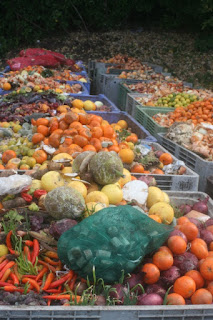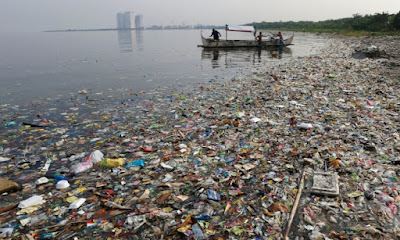Progress in the Fight Against Food Waste
In
case you missed it, WRAP recently released a report entitled ‘Quantification of food surplus, waste and
related materials in the supply chain’.
For the first time, it gave an official estimate for the amount of surplus
which is fit for human consumption in the food and drink industry that could be
used to feed hungry people: 270,000 tonnes each year. Currently, only around
10,000 tonnes of food is redistributed to charities each year - just the tip of
the food waste iceberg. Yet progress is being made, both here in Manchester and
across the UK.
 It
can be easy to forget just how far we have come in the last decade in terms of
how we view sustainability and waste in this country, and around the world.
FareShare was only set up in 2004, and already the spectrum of debate around
what we consume and throw away has rapidly changed in the last few years.
It
can be easy to forget just how far we have come in the last decade in terms of
how we view sustainability and waste in this country, and around the world.
FareShare was only set up in 2004, and already the spectrum of debate around
what we consume and throw away has rapidly changed in the last few years.
The
emergence of developing technologies on smartphones and mobile devices has
connected us in so many ways, but only recently have these developments been
used as a way to try to feed more people.
WRAP’s
report suggests there is a minimum of 270,000 tonnes of edible food surplus
that could be redistributed to charities each year, and used to feed people in
need. FareShare believes the figure might
even be higher. This
means that there is still a lot of work to be done, but it is important to
recognise how far we have already come.
FareShare is currently handling around
3% of the edible surplus food that is available in the UK, which equates to more
than 9,000 tonnes redistributed to charities last year alone; this amounts to 18 million meals distributed to hungry people by a
wide range of brilliant charities and organisations in 2015/16.
As momentum builds, more charities are
able to make good use of the excess food surplus. Here at FareShare Greater
Manchester, the food we diverted from waste and redistributed to local
charities increased by 20% last year, to 751 tonnes, enough for charities and
community groups across the region to provide 1.3 million m
These
figures are expected to rise as more and more companies look to bring
sustainability into focus and see how they can remove unnecessary waste from
their supply chains.
Lucy Danger, CEO of EMERGE 3Rs, who run
FareShare Greater Manchester, says, “Food
businesses may be unsure about the types of surplus food we can take for redistribution
or feel daunted about the prospect of diverting their produce to us, but
FareShare works closely with them to make it as easy and cost-effective as
possible to identify their surplus foods in order to, safely and compliantly,
get it to the people who need it most. We do this professionally, we don’t
undermine brands, we save the donor companies money in terms of disposal and
give them plenty of corporate brownie points.”
Another
key driver in terms of reducing food surplus and food waste has been the
incredible time and effort put in by volunteers and staff in the sector, day in
and day out. Without so many hands on deck working tirelessly to stop food
being wasted and get it redistributed to the right people, these figures
wouldn’t look anywhere near as promising.
As fresh food degrades so quickly, a speedy turnaround is paramount. There is still such a long way to go, but if we continue down this current path and get as many people on board and trained up as possible, we can help to make a significant difference in reducing food waste and fighting hunger at the same time. If you are thinking about getting involved, there has never been a better time to do so.
As fresh food degrades so quickly, a speedy turnaround is paramount. There is still such a long way to go, but if we continue down this current path and get as many people on board and trained up as possible, we can help to make a significant difference in reducing food waste and fighting hunger at the same time. If you are thinking about getting involved, there has never been a better time to do so.
Live
or work in Greater Manchester? Can you help volunteer in the depot or drive our
vans? Are you a local business looking to redirect your surplus food? To find
out how you can help tackle food waste right now please see: www.emergemanchester.co.uk/fareshare or give us a call: 0161 223 8200
Option 4 :)




Comments
Post a Comment